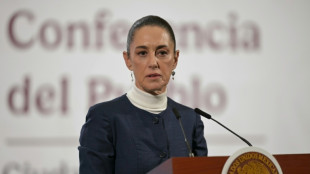China imposes tariffs on US energy, autos in trade war retaliation
China said Tuesday it would impose tariffs on imports of US energy, vehicles and equipment, firing a return salvo in an escalating trade war between the world's two biggest economies.
US President Donald Trump on Saturday announced sweeping measures against major trade partners Canada and Mexico, with goods from China hit with an additional 10 percent tariff on top of the duties they already endure.
Minutes after they came into effect, Beijing unveiled levies of 15 percent on imports of coal and liquefied natural gas from the United States, while crude oil, agricultural machinery, big-engined vehicles, and pickup trucks face 10 percent duties.
China is a major market for US energy exports and according to Beijing customs data, imports of oil, coal and LNG totalled more than $7 billion last year.
But that is dwarfed by China's imports from more friendly powers such as Russia, from which it purchased $94 billion-worth last year.
Beijing said the measures were in response to the "unilateral tariff hike" by Washington.
The US decision, China said, "seriously violates World Trade Organization rules, does nothing to resolve its own problems, and disrupts normal economic and trade cooperation between China and the United States".
With that in mind, Beijing said it would file a complaint with the WTO over the "malicious" levies.
Alongside its tariffs, China announced a probe into US tech giant Google and the addition of US fashion group PVH Corp. -- which owns Tommy Hilfiger and Calvin Klein -- and biotech giant Illumina to a list of "unreliable entities".
Beijing also unveiled fresh export controls on rare metals and chemicals including tungsten, tellurium, bismuth, and molybdenum, used in a range of industrial appliances.
"I think the retaliation is not aggressive, as China only targets some US products, in response to the US tariff on all China's exports to the US," Zhang Zhiwei of Pinpoint Asset Management said in a note.
"This is likely only the beginning of a long process for the two countries to negotiate"
- Canada, Mexico deals -
Trump has said his tariffs aimed to punish countries for failing to halt flows of illegal migrants and drugs including fentanyl into the United States.
But he said Monday that he planned a call with Chinese counterpart Xi Jinping in the next 24 hours.
Mexican President Claudia Sheinbaum and Canadian Prime Minister Justin Trudeau had both earlier struck last-minute deals with Trump to tighten border measures against the flow of migrants and fentanyl into the United States, leading to a 30-day pause on threatened tariffs.
Asian equities spiked Tuesday on news of the paused tariffs, and hopes that similar negotiations could relieve the levies against the world's number-two economy provided extra optimism.
However, traders pared some of those gains as China unveiled its measures.
Markets had slumped Monday as Trump's threat of sweeping levies on imports from Canada and Mexico sparked fears of a global trade war.
The president said that after "very friendly" talks with Sheinbaum he would "immediately pause" the tariffs on Mexico, and that his counterpart had agreed to send 10,000 troops to the US-Mexico frontier.
- 'Not a trade war' -
Tensions appeared higher between the United States and Canada -- but after two calls with Trudeau, Trump said on Truth Social that the prime minister had "agreed to ensure we have a secure Northern Border, and to finally end the deadly scourge of drugs like Fentanyl".
Trudeau said Canada would deploy nearly 10,000 frontline officers to help secure the border, list drug cartels as terrorists, appoint a "Fentanyl Czar" and crack down on money laundering.
It was not clear the real extent of the changes on the Canadian border, given that authorities said in December they already had 8,500 personnel deployed.
Canada, China and Mexico are the United States's three biggest trading partners.
The White House said earlier there had been a "heck of a lot of talks" over the weekend.
"This is not a trade war, this is a drug war," National Economic Council Director Kevin Hassett told CNBC, complaining that "the Canadians appeared to have misunderstood the plain language".
However, US government figures show that only a minimal quantity of drugs enter via Canada.
- 51st state? -
Ottawa had vowed to respond strongly to the tariffs.
Canadians have booed the US national anthem at sporting events, cancelled holidays in the United States and boycotted American products.
Its most populous province Ontario on Monday banned US firms from bidding on tens of billions of dollars in government contracts -- and dumped a deal with Trump ally Elon Musk's Starlink.
Trump has upped the pressure recently by calling Canada's existence into question -- once again advocating on Monday for it to become the 51st US state.
A political crisis in the Canadian government over Trump's tariff threats led to Trudeau announcing last month that he would resign. Canadians now face elections as early as April.
Mexico has meanwhile been under heavy pressure to secure its border with the United States as Trump vows a massive crackdown on undocumented migrants.
burs-oho/je/dan
D.Wolf--MP



